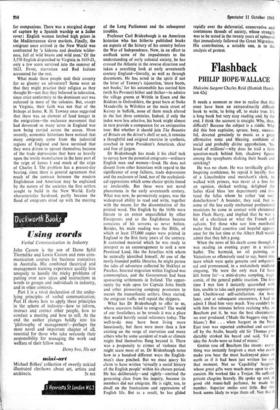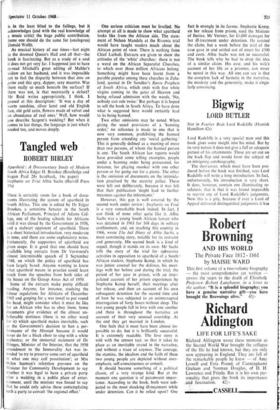Flashback
PHILIP HOPE-WALLACE
It needs a moment or two to realise that this must have been an extraordinarily difficult book to write, to bring off, to make true. It's a long book but very easy reading and,' by the end, I think the account is straight. Why, then, difficult? Because the subject is a riddle. Why did this bon capitaine, spruce, busy, success- ful, devoted genuinely to music as a great affirmative tonic and blessing, confident of social and probably divine approbation, 'be- loved of millions'—why does he trail a faint question-mark behind him, shadowy figures among the sycophants shaking their heads and smirking?
He was no sham. He was terrifically gifted. Inspiring confidence, he repaid it loyally. Son of a Lincolnshire coal merchant's clerk, he walked with princes, was never at a loss for an opinion, shirked nothing, delighted the ladies (God bless 'em department) and irri- tated the fellas whom he rather 'cut out,' doncherknow? A bounder, they said. Just as some of the less easily enchanted professional musicians he came in contact with christened him Flash Harry, and implied that he was a bit of a charlatan or what the French call cabotin. Yet those who saw him moribund make that final assertive and hopeful appear- ance for the last time at the Albert Hall would admit that they felt a pang.
When the news of his death came through, I was reading an evening paper in a station buffet. The barmaid, no oil painting, as Victorians so offensively used to say, burst into tears which were quite genuine and unhysteri- cal and pronounced, in a melancholy midland singsong, 'He were the only man I'd have left home for'—a mini-drama sampling, tragi- comic, of the general public reaction. The first time I met him I instantly quarrelled with him, unable to take such peremptory superiority and Cheshire-cat self-satisfaction. An hour later, and at subsequent encounters, I had to admit I liked him very much. You couldn't be with him five minutes before realising why, as Beecham put it, he was the best choirmaster we ever produced. Made the buggers sing like blazes.') But . . . when Sargent in the Near East tour was reported ambushed and carried off by the Arabs, beastly old Sir Thomas pre- dictably stroked his beard and said, 'I'd no idea the Arabs were so fond of music.'
Genius rose off Beecham like steam: every- thing was instantly forgiven a man who could make you hear the most hackneyed piece on earth as if it had been just written for you that moment. Not so 'Capability' Sargent, whose great gifts were much more open to dis- cussion. He worked like a Trojan. He suffered private chagrins bravely. He spoke up and. in good old music-hall parlance, he made his number. Superior smiles cost little. But this book seems likely to wipe them off. Not that it is in the least blind to the failings, but it acknowledges (and with the real knowledge of a music critic) the huge public contribution. Some one should do the same for (analogous) Donald Wolfit.
As musical history of our times—last night in the doomed Queen's Hall and all that—the book is fascinating. But as a study of a soul it does not get very far. I happened just to have re-read Mitchell's great editing of Mahler's widow on her husband, and it was impossible not to feel the disparity between that iime en peine and this spry, dapper, sexy maestro. Was there really so much beneath the surface? If there was not, is that necessarily a defect? Mr Reid writes appropriately, I think. I paused at this description: 'It was a day of warm sunshine, silver lame and old English lace, old gold satin, flowers made of velvet and an abundance of real ones.' Well, how would you describe Sargent's wedding? But when it comes to last things, the language is just what's needed too, and moves deeply.







































 Previous page
Previous page